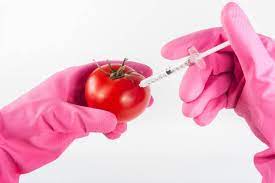Benefits of Biotechnology Application to Agriculture
As already described in preceding Units, several crops have been genetically engineered to be more productive, grow on zero-till land and to be pest (insect and weed resistant) resistant.
The impact of these attributes to environmental quality is enormous. It offered increased food production and improved food security without the need for increased land clearance and tillage.
It is estimated that the world needs at least 70% more food by 2050 when the global population is expected to reach 9 billion. Improvements in agricultural practices and technologies have achieved huge successes in helping to meet the food, feed and fibre needs of this growing population.
However, by its very nature, agriculture is disruptive to the environment and much work and research is now taking place to limit and decrease the “environmental footprint” the expected rapid increase in production would leave.
Development of resistant crops is helping to achieve this goal because they are grown without the need for increased land clearing and tillage.

They are insect and herbicide resistant and offer an alternative to chemical inputs and have allowed development of more targeted, flexible, effective and sustainable integrated pest management programmes.
Read Also: Disadvantages of Biotechnology on Agriculture
For instance, between 1996 and 2009 it reduced pesticide spraying by 393 million kg (i.e. 8.7%), as a result, decreased the environmental impact associated with herbicide and insecticide use on the area planted to biotech crops by 17.1%.
During the same period, biotech crops contributed to sustainability and climate change by:
1) Increasing crop production and value to US$65 billion,
2) Providing a better environment by saving 393 million kilogram active ingredients of pesticides,
3) In 2009 reducing CO2 emissions by 18 billion kilograms, equivalent to taking 8 million cars off the road,
4) Conserving biodiversity by saving 75 million ha of land, and
5) Helping alleviate poverty by assisting 14.4 million small farmers, among the poorest people in the world.
Furthermore, by leaving the soil undisturbed, more moisture is retained, which is good for water conservation. Other indirect benefits of zero-tillage in biotech crops production are improved conservation of beneficial soil insects and earth worms.
By using fewer fuel powered agricultural machines required in land clearance and tillage, carbon dioxide emissions to the atmosphere are decreased and fossil fuels are conserved.
Less tractor traffic also causes indirect benefits to soil quality, and hence a reduced contribution towards global warming.
Using biotechnology in the growth and production of fruits and vegetables has enabled scientists to change the way they ripen.
Normally fruits and vegetables continue to ripen after harvesting; they must be rushed to market and sold quickly while they are fresh.
Genetically-modified produce can be harvested when ripe, and the ripening process stops, giving them a longer shelf life.
These genetic modifications also increase a plant’s resistance to disease, pests, insecticides, herbicides and even extreme weather conditions.
Genetic engineering has also altered a plant’s nutritional makeup, making it richer in certain vitamins or minerals.


